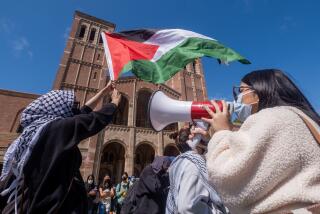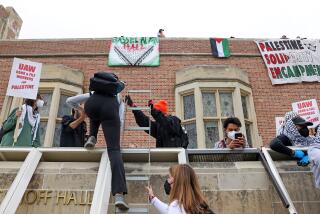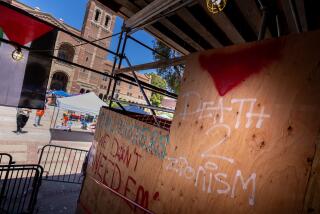Hamas Blocks PLO Victory in Key Vote : West Bank: Militants seize hostages at Hebron University, a bellwether of Palestinian politics. Grievances will be studied.
- Share via
HEBRON, Israeli-Occupied West Bank — Islamic militants, fearing a serious election defeat in one of their most important strongholds, prevented voting Tuesday in the student council election at Hebron University by seizing the school’s main building and taking hostage about 50 staff members.
Although supporters of the Islamic Resistance Movement, known as Hamas, had already withdrawn from the election and called for a boycott, about 70 of its members moved into the administration building before voting began, locked the doors behind them and declared themselves to be “at the barricades” in opposition to the Palestine Liberation Organization.
After lengthy mediation by Hebron community leaders, the Islamists released their hostages unhurt and left the building late Tuesday; in return, the university’s trustees pledged to examine Hamas’ grievances about the conduct of the elections, suggest ways of resolving them and then reschedule the voting.
Israeli troops watched from the outskirts of the hillside campus but did not intervene. Tension remained low despite the occupation of the administration building with administrators, teachers and students held hostage.
“Our Palestinian people, like all peoples, have differences of opinion, and that is normal,” commented Zuheir Maraka, one of the mediators. “What we must do is find a way to resolve them peacefully and democratically.”
Even after the confrontation was resolved, however, the incident remained a setback for the PLO, which had counted heavily on winning the Hebron University elections, an important bellwether in Palestinian politics, and on demonstrating the West Bank’s readiness for self-government.
“Some of our people do yet not understand that in a democracy we make decisions through the ballot box and not by force,” Nabil abu Znaid, a university official and prominent PLO activist, said, speaking through the bars on his office window as he was held with other staff members. “Hamas was not prepared to accept the defeat that was coming to it for its opposition to the peace process and the negotiations with Israel.”
But Mahmoud Salhab, 26, who belongs to the Islamic Bloc at the school and is studying Islamic law here, contended that it was Fatah, the mainstream movement within the PLO, that was subverting Palestinian democracy, attempting to steamroller the Hebron students into supporting the negotiations with Israel and accepting limited self-government while campaigning here on campus issues.
“We make no apology for blocking what would have been an undemocratic election,” Salhab said.
Fatah, he charged, had brought in nearly 200 new freshmen, paying their fees, to assure its victory in the election. PLO Chairman Yasser Arafat, the leader of Fatah, had personally directed the campaign, he said, with the intention of defeating Hamas.
“This is the kind of democracy that you will see in the Palestinian state,” another Hamas supporter declared. “We blocked the election here so that Fatah does not try its strong-arm methods again.”
The mood of the 1,200 students who had come expecting to vote largely favored Fatah, which campaigned heavily here.
“Hamas liked Hebron elections when it won,” Sharif Ibaido, 28, a former political prisoner who is now studying history, commented. “But the political trend is running against it now and for Fatah. People want peace, people want a Palestinian state, people want coexistence with Israel if that is what it takes to end Israel’s occupation. . . .
“The last elections were different, and Hamas won, because there were no real negotiations and no real prospect of independence. Hamas is now standing against the people, and it consequently will lose.”
These tests of strength--elections for student councils, chambers of commerce, trade unions, women’s associations and professional groups--have increased in importance as the Palestinians negotiate with Israel for a five-year period of political autonomy for the West Bank and Gaza Strip.
“Who speaks for the people?” Abu Znaid commented. “This is a vital question. Everyone wants to know--especially our own people--who has the democratic mandate, and they look to these small-scale elections. . . .
“Political competition is keen as a result, but I never thought I would be taken hostage by my own people. Clearly, we have a lot to learn about democracy.”
Abu Znaid has been a key figure in Fatah’s election campaign, which was launched after Hamas swept the last four student council elections and then won most of the seats on the Hebron Chamber of Commerce.
Arafat, alarmed at Hamas’ control over such a key city, personally shaped Fatah’s strategy, which has focused on two sets of issues--achieving autonomy and then independence through negotiations with Israel and improving the university’s standard of education.
The PLO chairman also allocated hundreds of thousands of dollars to assist students and the school. On Monday, he spoke to an election rally by telephone from Tunisia.
“Hebron is too large, too wealthy and politically too important to have it against you,” another student leader said, “and so Arafat decided to retake it. But Hamas has held Hebron for more than five years, and recovering it for Fatah has been a difficult and costly operation that is still under way.”
More to Read
Sign up for Essential California
The most important California stories and recommendations in your inbox every morning.
You may occasionally receive promotional content from the Los Angeles Times.













